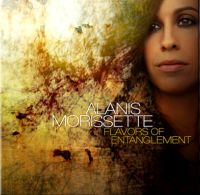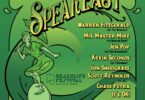By Susie Salva
Seven-time Grammy winner Alanis Morissette is set to release “Flavors of Entanglement” on Maverick/Reprise records on June 10th, her first studio album in four years. Recently, we had the opportunity to get Alanis’ personal perspective on things.
Q: The new album obviously comes from kind of a dark place; you’ve talked about hitting bottom before, as you were writing the songs. Could you elaborate on what was going on and what kind of creative path that led you towards?
Alanis Morissette: Well, it was really my having taken a break for the first time in a long time. I had taken one break when I went to India. But I had not stopped for any length of time. Basically I was tending to my personal life, just wanting to kind of shake my tree, so to speak.
I was traveling a lot, I went Fiji, spent some time in Big Sur, I went to the Maldives, did a little bit of charity work here and there, gutted my house and refurbished the whole thing from the ground up and just basically lived the life that I would then later comment on in my songs. And the rock bottom that I speak of was just a personal unraveling of a couple of very significant relationships in my life at the time.
And so the record on one level kind of chronicles the unraveling and the rock bottom finally being hit and then the phoenix rising kind of dregs of hope that always imbue anything I create.
Q: Do you ever worry about whether those dregs of hope are ever going to be there at the end?
Morissette: I don’t any more. When I first started writing I wasn’t even familiar with the whole process of song writing to the point where I could rely on anything. But at this point, I think it just speaks to what my true nature is, which is one that is always, hope filled, no matter how dire circumstances get. That will wind-up, inevitably, showing up in my songs.
Q: Could you please give us some sense of the Alanis who made “Flavors of Entanglement” as compared to Alanis circa “Jagged Little Pill”?
Morissette: There is the same menu of emotions available to me. I am less afraid of them now, whether it’s anger or fear or pain or joy or exaltation. They bowl me over a lot less, and I’m a little less reactive with them, in that I know how to channel them. In the past they would either explode or I would implode, which I think the latter is actually even sometimes more harmful, certainly to the p
Q: You’ve often talked about needing to kind of recover from the fame that you’ve had and you’ve had all along, that being part of kind of this whole process you had leading into the album and I’m curious in what ways you’re trying to recover, as you say from fame, what that meant?
Morissette: I am a sensitive creature, to say the least. One of my favorite things to do, before 1995 was to people watch. So I would literally sit on park benches and just watch people go by. And as soon as “Jagged Little Pill” was released, I became the watched. So it just turned the tables on me a little bit that was really uncomfortable. And the irony of my being in the public eye, with such fierceness in the moments that I am, is that I actually am uncomfortable being in the public eye. It’s not my preference to be out there in that way. So my recovery in that sense was really adjusting to the entirely new lifestyle, whether it was the financial affluence all of a sudden, I didn’t even know how to deal with that. There was notoriety, in just my being recognized everywhere I went. And also thought that the purported result of fame, as it was sold to me as a kid, was that you would be happy and everyone would love you. And I noticed that upon having achieved fame in that sense, nothing really changed internally. It became more of a sort of public ride versus a private one.
Q: Since it was four years in between studio albums, was the process for writing “Flavors of Entanglement” different from your process had been in the past. How was the input of Guy Sigsworth (producer) involved in that?

Q: You also call it a more immediate album, at least in the bio material, that it’s a chronicle of things that were happening, not in retrospect, but immediate in your life.
Morissette: Yes, it was all happening in real time, whereas a lot of songs I write I’ll be commenting on things that perhaps happened six months prior or sometimes even ten years prior. Whereas in this case, when I was writing songs like “Not as We” and “Moratorium” and pretty much all of the songs on the record, what I was commenting on, was literally happening in that moment, so it was very present tense.
Q: Are there are nerves with this new record or relief that it’s being shared?
Morissette: I always enjoy putting a record out, because it updates where I am at. Even though technically this is about a year ago, so it’s not updating where I’m at in this moment. So if someone is thinking that they have a sense of where I’m at by listening to a song I wrote ten years ago or four years ago, while some of it may be accurate, some of it isn’t. So putting a record out is always a relief for me, because it brings everything to the present.
Q: You said something about hitting rock bottom. When you’re in that kind of place, would you rather kind of wallow in it or do you try to snap yourself out of it? And do you have any guilty pleasures that either kind of help you really indulge that feeling or get over it?
Morissette: I find the most torturous thing that I can do to myself when I’m feeling anything is try to resist it. And lord knows I always try to resist it, especially when it’s painful. So I’ll scramble along resisting it and being tortured and then the second I stop and let myself feel it all the way through and just have the direct experience of whatever I’m feeling, I notice that it’s not bottomless, eventually. So that helps. But yes, in terms of little creature comforts you mean, if I’m having rough go what do I turn to? It really depends on any given moment. My addictions of choice are – I’m usually just a love addict or a workaholic, so a lot of time working helps. But soup or tea, anything hot water oriented helps; hot tubs, soup, tea, bathtubs, that is my number one go to, if I’m actually doing the self-caring approach.
Q: You mentioned that you gutted your house and rebuilt it from the ground up when you had the four years off in between albums, I know you’re an environmentally very friendly individual, I’m wondering if you incorporated any Green aspects to your rebuild and if you’re going to be incorporating any environmentally friendly measures on your tour or even your CD packaging?
Morissette: We had bio-diesel buses on this tour and I’m very excited to continue that trend. In terms of rebuilding the house, yes I did whatever I could and I built in recycling areas in each room and have solar panels outside of my house. I drive a Prius. On the CD, well I started a bunch of years ago, I think the company was called Living Tree Paper; I wanted to have my CD be in recyclable materials. And at the time the record company was not able or willing to pay for it, so I paid for it myself. And that has been the case in a few examples, where I just want to use recyclable material wherever I can, so I’ll pay for it myself. And this time around I’d like to do the same, and we’ll see who has to pay for it. I don’t mind though, it’s something I’d happily pay for.
Q: When are we going to see you in North America?
Morissette: We are rehearsing right now, so your guess is as good as mine. But I do know that we will be playing quite a bit of the songs from this new record and songs from the last 13 years, and I have two new band mates, Vince Jones on keyboards, whom I just started playing with and Victor Indrizzo on drums. So any time there are new band mates that are integrated into the band, it infuses and imbues the songs that perhaps we’ve played before, with a new energy.
Q: How do you think you’ve evolved as a songwriter, especially in your new CD?
Morissette: I believe the process is – it’s always been an accelerated process, even when I was writing with Glen Ballard, the songs would take maybe 20 to 30 minutes to write, most of them. And now I count on that. If a song is a belabored process or an overly intellectualize process, I usually stop it in its tracks, because the song just isn’t meant to be written, if that’s the case. So I just rely on the fact that if a song is to come through and I’m to love it, it ostensibly should take maybe 20 or 30 minutes. So that would be the biggest piece, I think.
Q: The songs on this record have a distinct flow; do you feel some trepidation over presenting it as a collection, knowing that people are going to tear it apart downloading? And is the CD still a valid form of expression for you?
Morissette: I think it’s a great and valid form of expression. And those who want it have access to it. And those who are more oriented to four minute pulling of the $.99 song, they have that available too. And what I feel comfortable about in that sense, in the sense of someone pulling one or two songs versus the whole record, is that they are their own distinct story, these songs. So I can share it in its entirety, because it is an entire journey for me, and those that want to be on the journey with me can go on it. But ultimately, when I share songs, people are invited to make it their own. So it’s no longer my property at that point, so they can do what they want with it.
Q: Is there still a place for the CD in your mind?
Morissette: Yes, I’m going to hold out until the last second, because I do like the physical, tangible piece in your hand. And the booklet, I put a lot of energy into co-creating that booklet. So I look forward to actually physically having it in my hand.








